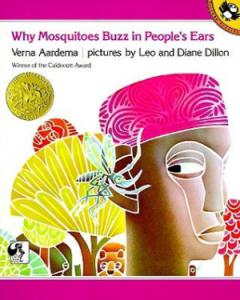Because pythons are paranoid and iguanas are grumpy.

This is one of those books that's a retelling of a tale, at least according to the subtitle of the book: "A West African tale". Of course just, as with "Native American" tales, there are tons of West African peoples of various beliefs, and just calling it a "West African" tale is crazy. Nowhere in the book, as far as I can see, does it describe who these "West Africans" were, or anything about their beliefs. Although the dedication of the book is, "For Marcia Van Guinan, who heard this story first." First?! I doubt she was the first person to hear it, if it was a traditional tale. But maybe it means "first" as in "before Verna Aardema." Whatever.
Anyhow, the story goes like this: A mosquito is talking to an iguana and says, "You will never believe what I saw yesterday." The iguana says, "Try me." The mosquito says, "I saw a farmer digging yams that were almost as big as I am." The iguana points out that mosquitoes are tiny, and that tiny yams are really not very interesting, and puts sticks in his ears to block out the sound of the mosquito. The weird thing is that the mosquito's tale is described later as a lie, which is not necessarily the case. It seems more like the mosquito is trying to make conversation and the iguana is just in a bad mood. Anyway, Python comes by and says "good morning" to the iguana, but because of the sticks, the iguana can't hear the python. The python seems to have a persecution complex and assumes the iguana is plotting against him, so he goes and hides in the nearest hole, which belongs to a rabbit, who panics and runs out, freaking out the crow, whose job it is to alert the rest of the forest of potential danger. The monkey hears this and runs to alert everyone else, jumping onto a dead tree branch along the way, which breaks and falls and lands in the nest of an owl, killing an owlet. The mother owl returns (she's out hunting still despite it being daytime), sees her dead child, and starts grieving. Her other children explain that it was the monkey who killed the child.
It's the mother owl's job to wake the sun in the morning (kind of like the Western idea of the rooster) and she doesn't bring the sun because she's so sad. The night gets too long, and all the other animals start getting upset, so the king of the forest, who is a lion (living outside of his natural habitat-- lions live on the plains), calls a meeting. They fetch Mother Owl, who explains that she's well upset because monkey killed one of her babies. So they call monkey to testify, and he says, "It was the crow!" Of course, what he should have said was, "It was an accident, I didn't mean to." But instead, they call the crow up, who explains it was the rabbit, who is accused of "[breaking] a law of nature and [going] running, running, running, in the daytime". Rabbits are actually crepuscular, which means they are awake mostly at twilight. But it's not super unusual for them to run in what humans would consider "daytime", as they are prey animals. The line of accusations continues on, a la "The House That Jack Built," until the iguana says "It was the mosquito!" At which point the other animals say, "Punish the mosquito!" Nobody suggests trying to bring the mosquito to defend herself, and she apparently wasn't invited to the meeting. Might makes right, I guess. But she happens to be spying on the meeting, so she runs and hides. Upon hearing that the mosquito will be punished, Mother Owl is satisfied, and brings the sun. And the mosquito goes around buzzing in people's ears to ask if she's forgiven yet. And the end of the book has a person, whose ear she was buzzing in, smacking the mosquito and presumably killing her.
I guess the illustrations are okay. They kind of remind me of certain styles of tribal art. I'm not an art expert, though, so I can't identify the inspiration very well. They're basically colored blocks divided by crisp white spaces that function the same way as lines in a line drawing.
But I don't think that a farmer digging up yams as big as a mosquito is that big of a lie. Maybe the book is trying to say, "Don't tell lies," but the message that comes out is that people will blame you for things that are clearly not your fault. While this is a true message, it's not necessarily an ideal one.